Impact of Policy on Care of People with Terminal Illnesses
VerifiedAdded on 2023/06/14
|7
|1622
|406
Essay
AI Summary
This essay examines the Australian Nursing and Midwifery Federation's (ANMF) policy on caring for individuals with terminal illnesses, highlighting the crucial role of nurses in providing holistic care, emotional support, and relevant information for end-of-life decisions, while adhering to legal and ethical guidelines against euthanasia. It emphasizes the significance of palliative care in alleviating pain and improving the quality of life for patients, along with the importance of respecting patient wishes and advance care directives. The essay further discusses the positive impact of the policy on patient wellbeing, including access to necessary medical and psychosocial support, the right to make informed treatment choices, and the maintenance of privacy and self-esteem. It concludes by considering the potential challenges patients would face without such a policy, such as increased pain, lack of information, social stigma, and neglect, underscoring the policy's essential role in ensuring dignified and supportive end-of-life care.
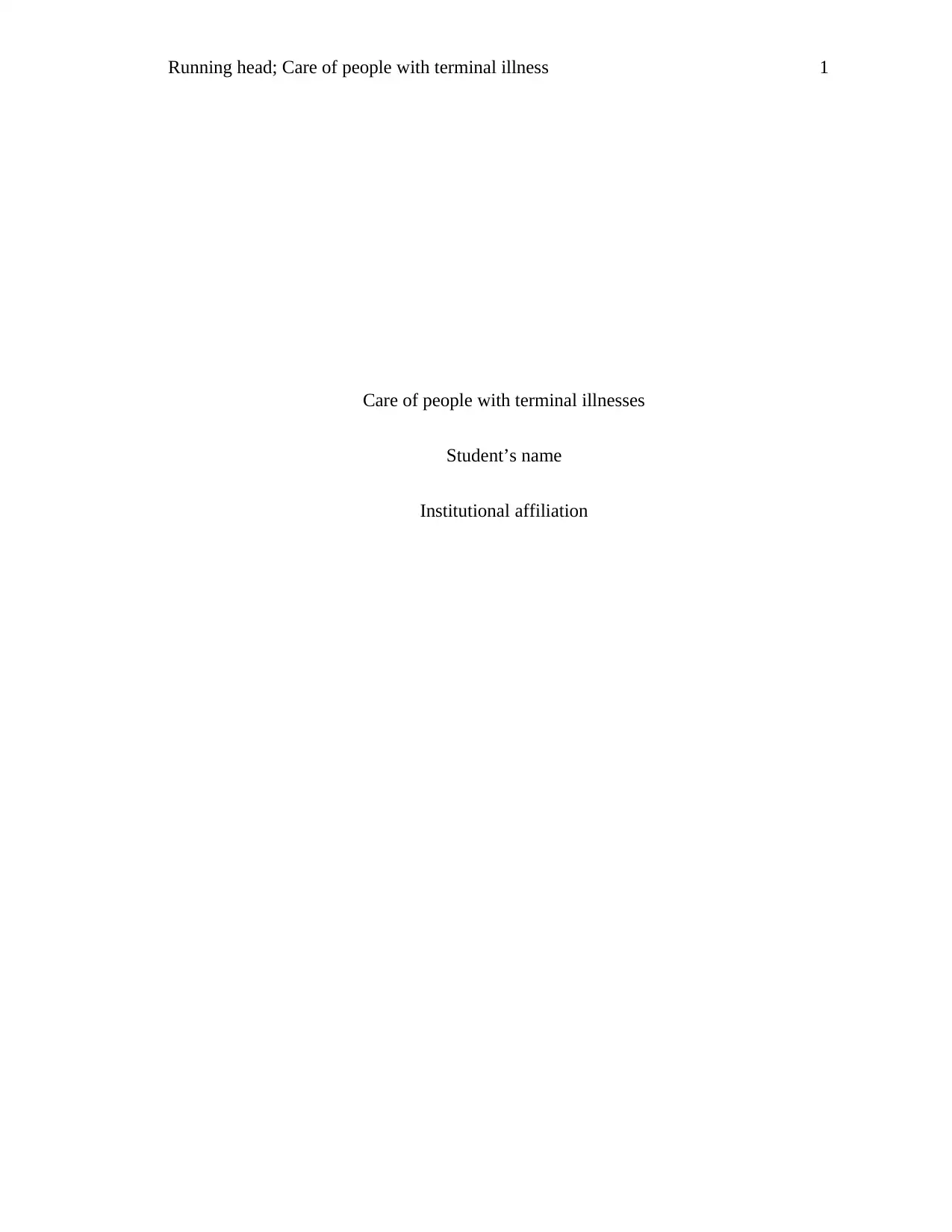
Running head; Care of people with terminal illness 1
Care of people with terminal illnesses
Student’s name
Institutional affiliation
Care of people with terminal illnesses
Student’s name
Institutional affiliation
Paraphrase This Document
Need a fresh take? Get an instant paraphrase of this document with our AI Paraphraser
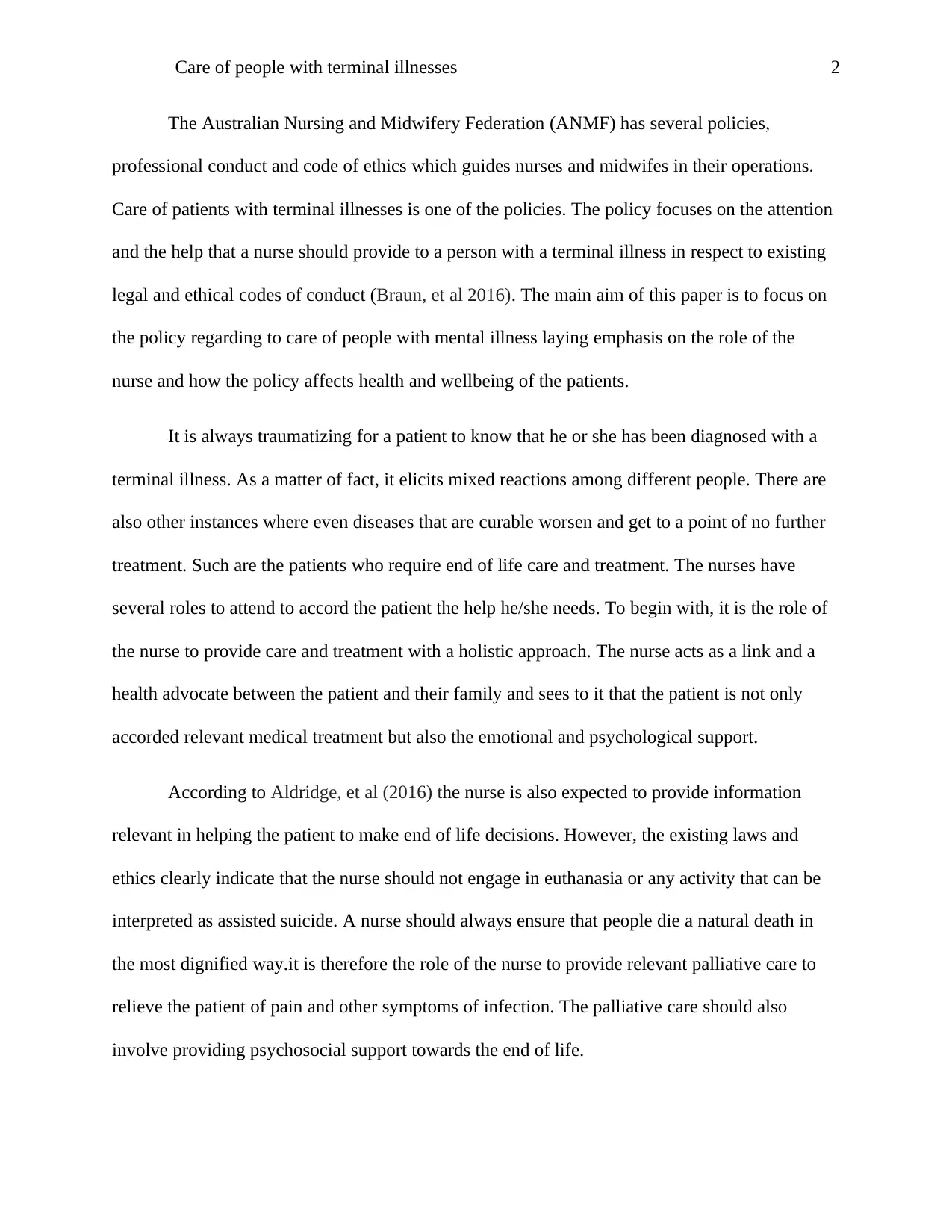
Care of people with terminal illnesses 2
The Australian Nursing and Midwifery Federation (ANMF) has several policies,
professional conduct and code of ethics which guides nurses and midwifes in their operations.
Care of patients with terminal illnesses is one of the policies. The policy focuses on the attention
and the help that a nurse should provide to a person with a terminal illness in respect to existing
legal and ethical codes of conduct (Braun, et al 2016). The main aim of this paper is to focus on
the policy regarding to care of people with mental illness laying emphasis on the role of the
nurse and how the policy affects health and wellbeing of the patients.
It is always traumatizing for a patient to know that he or she has been diagnosed with a
terminal illness. As a matter of fact, it elicits mixed reactions among different people. There are
also other instances where even diseases that are curable worsen and get to a point of no further
treatment. Such are the patients who require end of life care and treatment. The nurses have
several roles to attend to accord the patient the help he/she needs. To begin with, it is the role of
the nurse to provide care and treatment with a holistic approach. The nurse acts as a link and a
health advocate between the patient and their family and sees to it that the patient is not only
accorded relevant medical treatment but also the emotional and psychological support.
According to Aldridge, et al (2016) the nurse is also expected to provide information
relevant in helping the patient to make end of life decisions. However, the existing laws and
ethics clearly indicate that the nurse should not engage in euthanasia or any activity that can be
interpreted as assisted suicide. A nurse should always ensure that people die a natural death in
the most dignified way.it is therefore the role of the nurse to provide relevant palliative care to
relieve the patient of pain and other symptoms of infection. The palliative care should also
involve providing psychosocial support towards the end of life.
The Australian Nursing and Midwifery Federation (ANMF) has several policies,
professional conduct and code of ethics which guides nurses and midwifes in their operations.
Care of patients with terminal illnesses is one of the policies. The policy focuses on the attention
and the help that a nurse should provide to a person with a terminal illness in respect to existing
legal and ethical codes of conduct (Braun, et al 2016). The main aim of this paper is to focus on
the policy regarding to care of people with mental illness laying emphasis on the role of the
nurse and how the policy affects health and wellbeing of the patients.
It is always traumatizing for a patient to know that he or she has been diagnosed with a
terminal illness. As a matter of fact, it elicits mixed reactions among different people. There are
also other instances where even diseases that are curable worsen and get to a point of no further
treatment. Such are the patients who require end of life care and treatment. The nurses have
several roles to attend to accord the patient the help he/she needs. To begin with, it is the role of
the nurse to provide care and treatment with a holistic approach. The nurse acts as a link and a
health advocate between the patient and their family and sees to it that the patient is not only
accorded relevant medical treatment but also the emotional and psychological support.
According to Aldridge, et al (2016) the nurse is also expected to provide information
relevant in helping the patient to make end of life decisions. However, the existing laws and
ethics clearly indicate that the nurse should not engage in euthanasia or any activity that can be
interpreted as assisted suicide. A nurse should always ensure that people die a natural death in
the most dignified way.it is therefore the role of the nurse to provide relevant palliative care to
relieve the patient of pain and other symptoms of infection. The palliative care should also
involve providing psychosocial support towards the end of life.
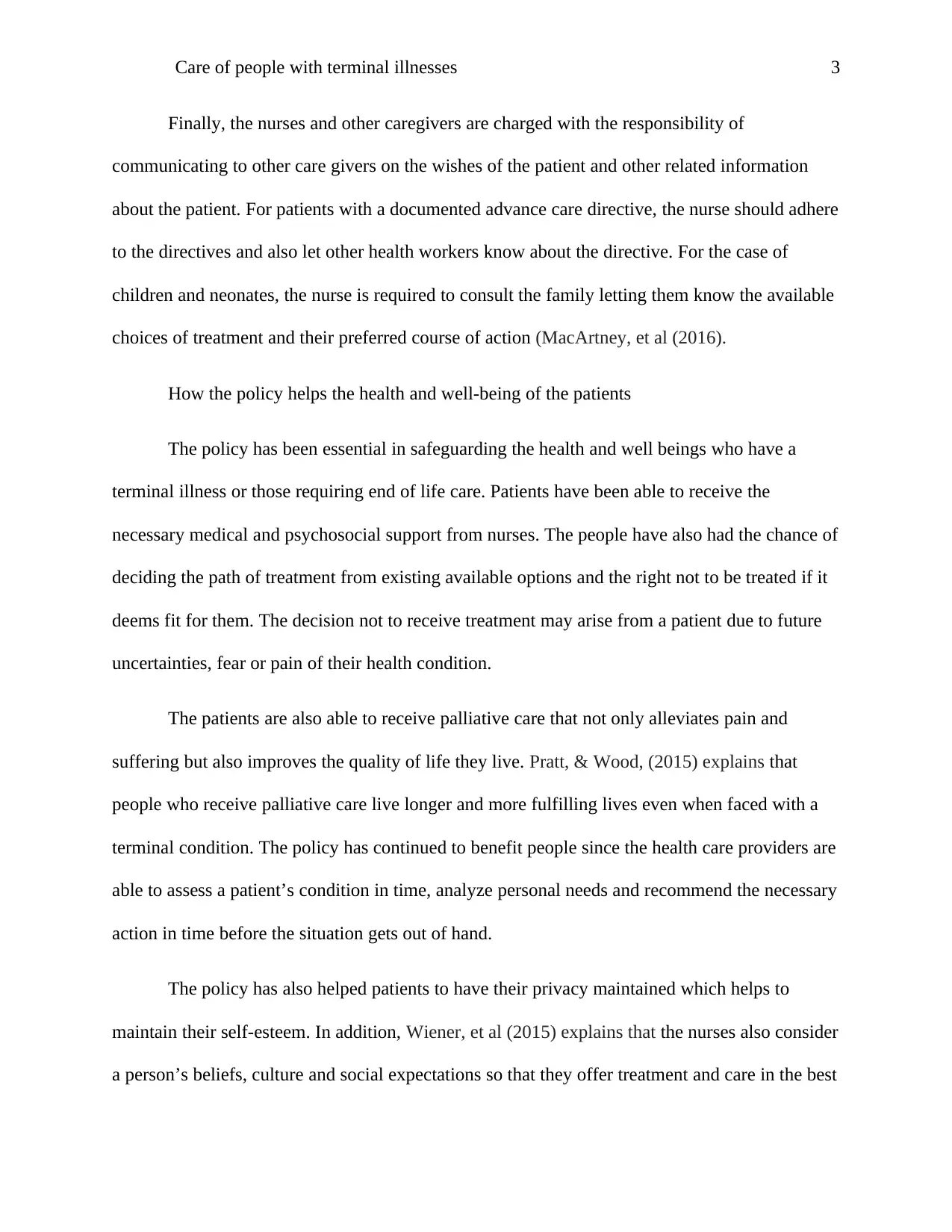
Care of people with terminal illnesses 3
Finally, the nurses and other caregivers are charged with the responsibility of
communicating to other care givers on the wishes of the patient and other related information
about the patient. For patients with a documented advance care directive, the nurse should adhere
to the directives and also let other health workers know about the directive. For the case of
children and neonates, the nurse is required to consult the family letting them know the available
choices of treatment and their preferred course of action (MacArtney, et al (2016).
How the policy helps the health and well-being of the patients
The policy has been essential in safeguarding the health and well beings who have a
terminal illness or those requiring end of life care. Patients have been able to receive the
necessary medical and psychosocial support from nurses. The people have also had the chance of
deciding the path of treatment from existing available options and the right not to be treated if it
deems fit for them. The decision not to receive treatment may arise from a patient due to future
uncertainties, fear or pain of their health condition.
The patients are also able to receive palliative care that not only alleviates pain and
suffering but also improves the quality of life they live. Pratt, & Wood, (2015) explains that
people who receive palliative care live longer and more fulfilling lives even when faced with a
terminal condition. The policy has continued to benefit people since the health care providers are
able to assess a patient’s condition in time, analyze personal needs and recommend the necessary
action in time before the situation gets out of hand.
The policy has also helped patients to have their privacy maintained which helps to
maintain their self-esteem. In addition, Wiener, et al (2015) explains that the nurses also consider
a person’s beliefs, culture and social expectations so that they offer treatment and care in the best
Finally, the nurses and other caregivers are charged with the responsibility of
communicating to other care givers on the wishes of the patient and other related information
about the patient. For patients with a documented advance care directive, the nurse should adhere
to the directives and also let other health workers know about the directive. For the case of
children and neonates, the nurse is required to consult the family letting them know the available
choices of treatment and their preferred course of action (MacArtney, et al (2016).
How the policy helps the health and well-being of the patients
The policy has been essential in safeguarding the health and well beings who have a
terminal illness or those requiring end of life care. Patients have been able to receive the
necessary medical and psychosocial support from nurses. The people have also had the chance of
deciding the path of treatment from existing available options and the right not to be treated if it
deems fit for them. The decision not to receive treatment may arise from a patient due to future
uncertainties, fear or pain of their health condition.
The patients are also able to receive palliative care that not only alleviates pain and
suffering but also improves the quality of life they live. Pratt, & Wood, (2015) explains that
people who receive palliative care live longer and more fulfilling lives even when faced with a
terminal condition. The policy has continued to benefit people since the health care providers are
able to assess a patient’s condition in time, analyze personal needs and recommend the necessary
action in time before the situation gets out of hand.
The policy has also helped patients to have their privacy maintained which helps to
maintain their self-esteem. In addition, Wiener, et al (2015) explains that the nurses also consider
a person’s beliefs, culture and social expectations so that they offer treatment and care in the best
⊘ This is a preview!⊘
Do you want full access?
Subscribe today to unlock all pages.

Trusted by 1+ million students worldwide
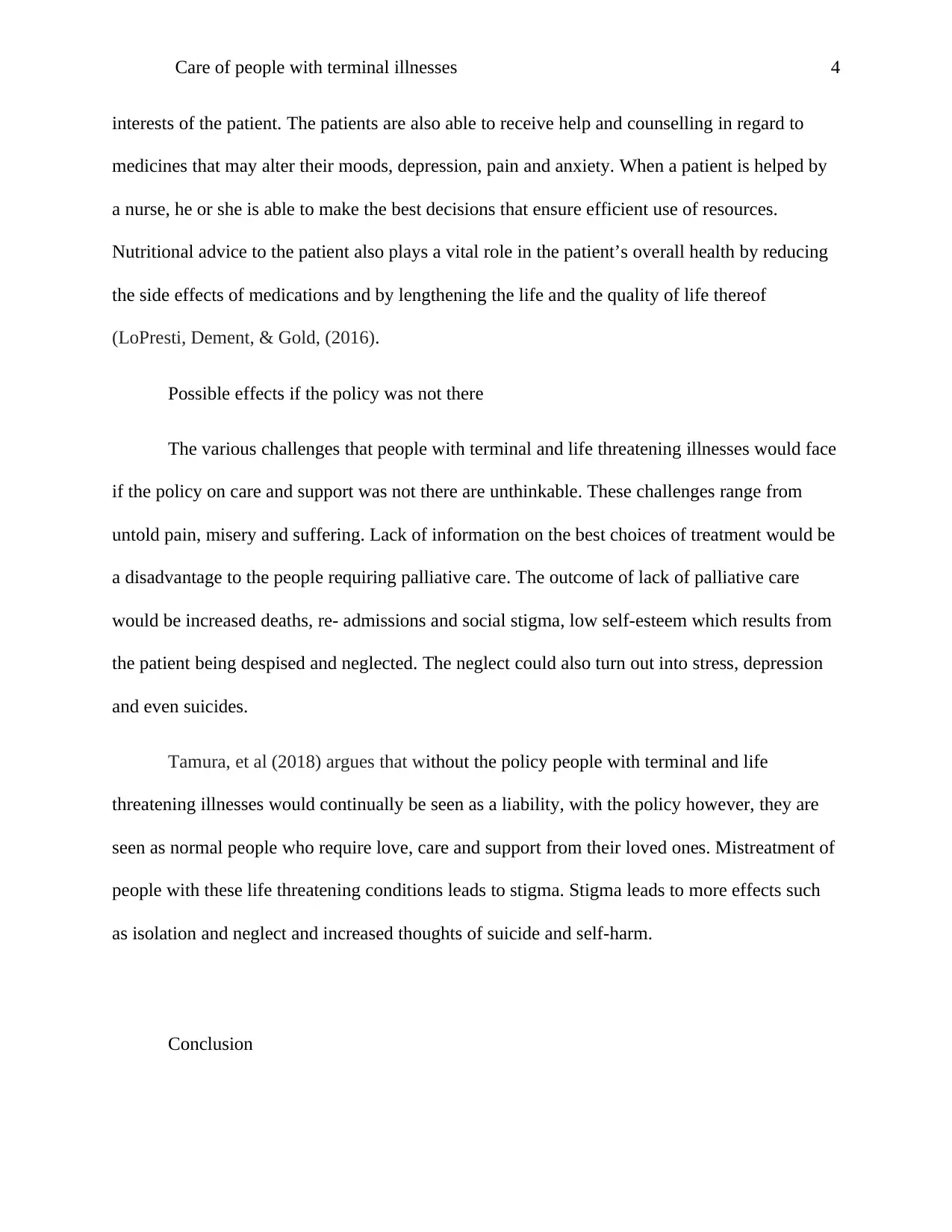
Care of people with terminal illnesses 4
interests of the patient. The patients are also able to receive help and counselling in regard to
medicines that may alter their moods, depression, pain and anxiety. When a patient is helped by
a nurse, he or she is able to make the best decisions that ensure efficient use of resources.
Nutritional advice to the patient also plays a vital role in the patient’s overall health by reducing
the side effects of medications and by lengthening the life and the quality of life thereof
(LoPresti, Dement, & Gold, (2016).
Possible effects if the policy was not there
The various challenges that people with terminal and life threatening illnesses would face
if the policy on care and support was not there are unthinkable. These challenges range from
untold pain, misery and suffering. Lack of information on the best choices of treatment would be
a disadvantage to the people requiring palliative care. The outcome of lack of palliative care
would be increased deaths, re- admissions and social stigma, low self-esteem which results from
the patient being despised and neglected. The neglect could also turn out into stress, depression
and even suicides.
Tamura, et al (2018) argues that without the policy people with terminal and life
threatening illnesses would continually be seen as a liability, with the policy however, they are
seen as normal people who require love, care and support from their loved ones. Mistreatment of
people with these life threatening conditions leads to stigma. Stigma leads to more effects such
as isolation and neglect and increased thoughts of suicide and self-harm.
Conclusion
interests of the patient. The patients are also able to receive help and counselling in regard to
medicines that may alter their moods, depression, pain and anxiety. When a patient is helped by
a nurse, he or she is able to make the best decisions that ensure efficient use of resources.
Nutritional advice to the patient also plays a vital role in the patient’s overall health by reducing
the side effects of medications and by lengthening the life and the quality of life thereof
(LoPresti, Dement, & Gold, (2016).
Possible effects if the policy was not there
The various challenges that people with terminal and life threatening illnesses would face
if the policy on care and support was not there are unthinkable. These challenges range from
untold pain, misery and suffering. Lack of information on the best choices of treatment would be
a disadvantage to the people requiring palliative care. The outcome of lack of palliative care
would be increased deaths, re- admissions and social stigma, low self-esteem which results from
the patient being despised and neglected. The neglect could also turn out into stress, depression
and even suicides.
Tamura, et al (2018) argues that without the policy people with terminal and life
threatening illnesses would continually be seen as a liability, with the policy however, they are
seen as normal people who require love, care and support from their loved ones. Mistreatment of
people with these life threatening conditions leads to stigma. Stigma leads to more effects such
as isolation and neglect and increased thoughts of suicide and self-harm.
Conclusion
Paraphrase This Document
Need a fresh take? Get an instant paraphrase of this document with our AI Paraphraser
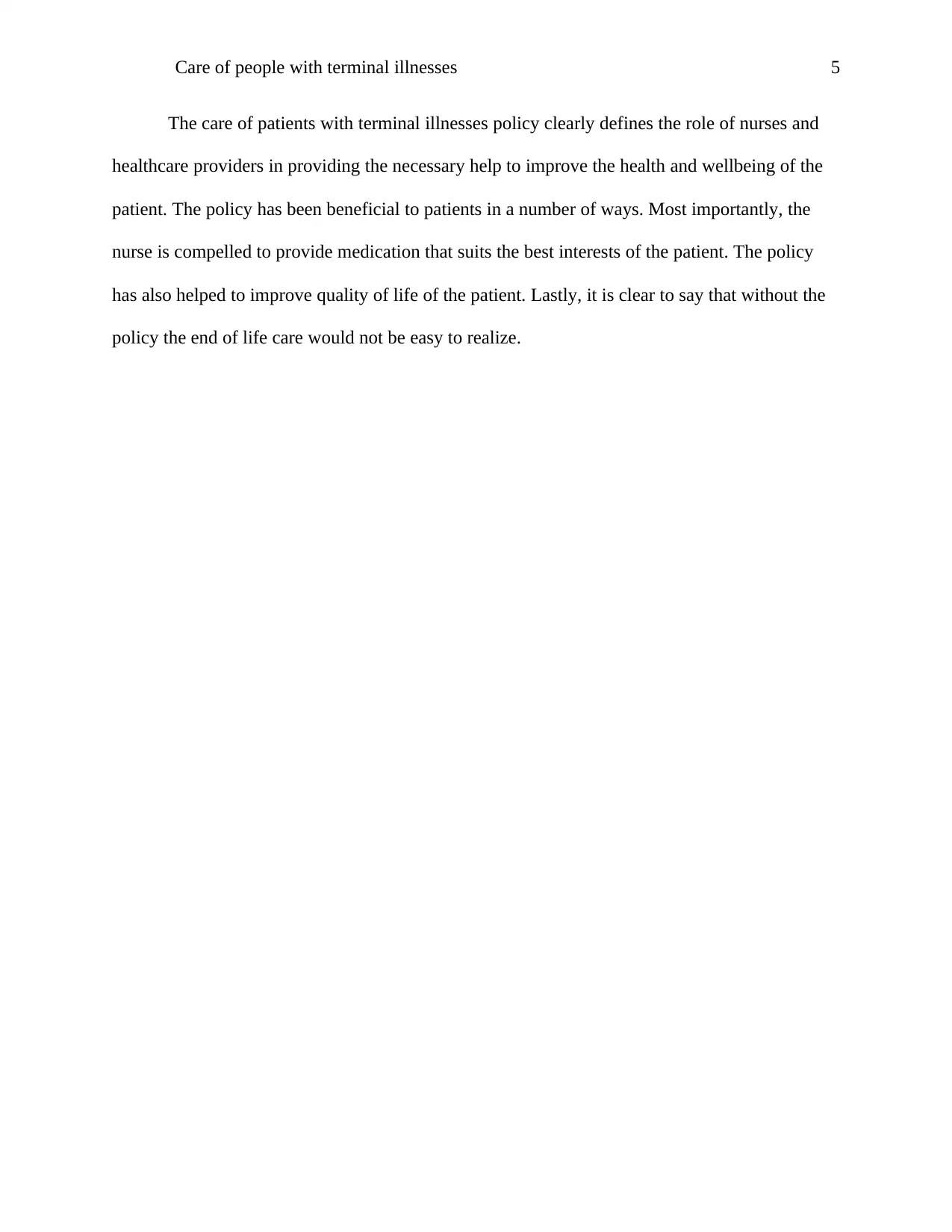
Care of people with terminal illnesses 5
The care of patients with terminal illnesses policy clearly defines the role of nurses and
healthcare providers in providing the necessary help to improve the health and wellbeing of the
patient. The policy has been beneficial to patients in a number of ways. Most importantly, the
nurse is compelled to provide medication that suits the best interests of the patient. The policy
has also helped to improve quality of life of the patient. Lastly, it is clear to say that without the
policy the end of life care would not be easy to realize.
The care of patients with terminal illnesses policy clearly defines the role of nurses and
healthcare providers in providing the necessary help to improve the health and wellbeing of the
patient. The policy has been beneficial to patients in a number of ways. Most importantly, the
nurse is compelled to provide medication that suits the best interests of the patient. The policy
has also helped to improve quality of life of the patient. Lastly, it is clear to say that without the
policy the end of life care would not be easy to realize.
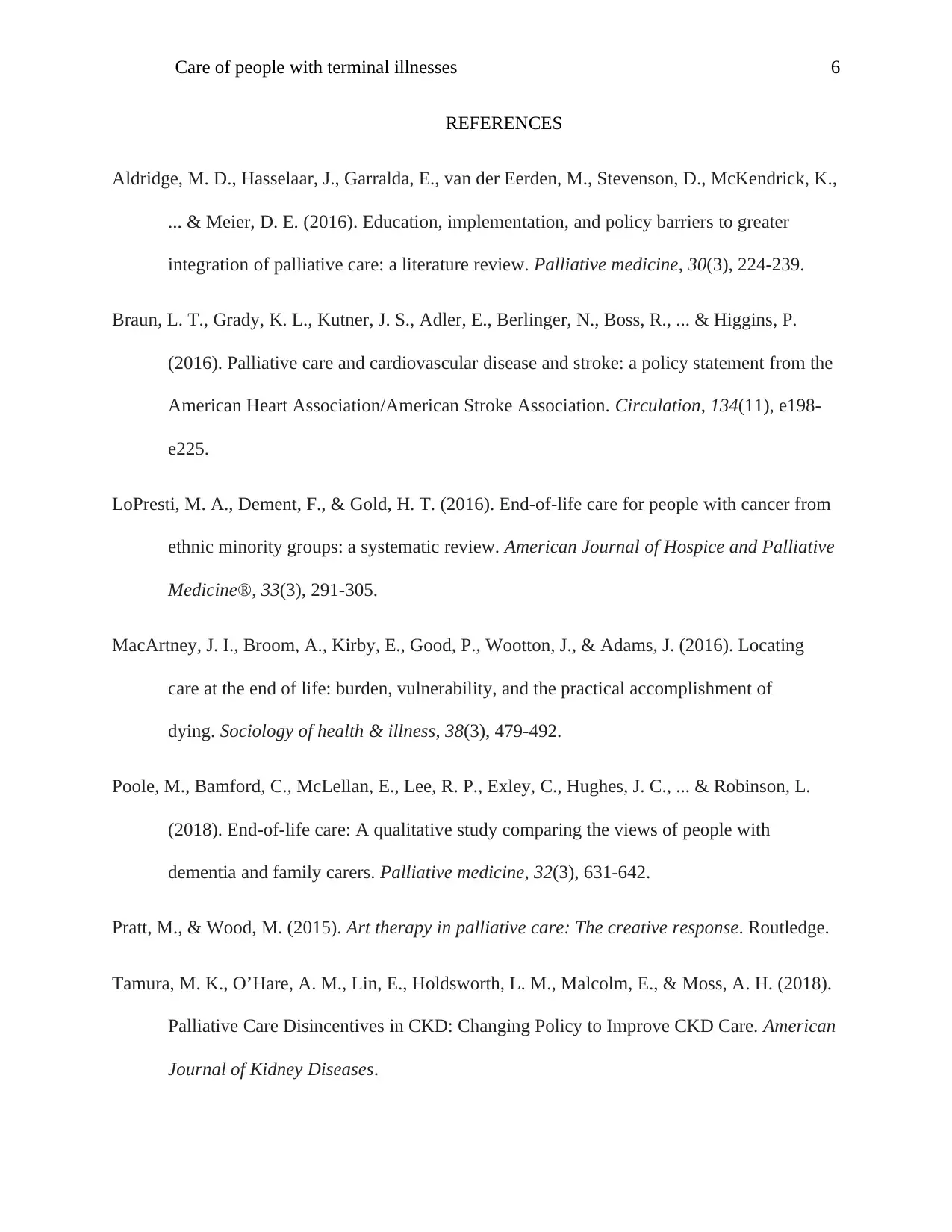
Care of people with terminal illnesses 6
REFERENCES
Aldridge, M. D., Hasselaar, J., Garralda, E., van der Eerden, M., Stevenson, D., McKendrick, K.,
... & Meier, D. E. (2016). Education, implementation, and policy barriers to greater
integration of palliative care: a literature review. Palliative medicine, 30(3), 224-239.
Braun, L. T., Grady, K. L., Kutner, J. S., Adler, E., Berlinger, N., Boss, R., ... & Higgins, P.
(2016). Palliative care and cardiovascular disease and stroke: a policy statement from the
American Heart Association/American Stroke Association. Circulation, 134(11), e198-
e225.
LoPresti, M. A., Dement, F., & Gold, H. T. (2016). End-of-life care for people with cancer from
ethnic minority groups: a systematic review. American Journal of Hospice and Palliative
Medicine®, 33(3), 291-305.
MacArtney, J. I., Broom, A., Kirby, E., Good, P., Wootton, J., & Adams, J. (2016). Locating
care at the end of life: burden, vulnerability, and the practical accomplishment of
dying. Sociology of health & illness, 38(3), 479-492.
Poole, M., Bamford, C., McLellan, E., Lee, R. P., Exley, C., Hughes, J. C., ... & Robinson, L.
(2018). End-of-life care: A qualitative study comparing the views of people with
dementia and family carers. Palliative medicine, 32(3), 631-642.
Pratt, M., & Wood, M. (2015). Art therapy in palliative care: The creative response. Routledge.
Tamura, M. K., O’Hare, A. M., Lin, E., Holdsworth, L. M., Malcolm, E., & Moss, A. H. (2018).
Palliative Care Disincentives in CKD: Changing Policy to Improve CKD Care. American
Journal of Kidney Diseases.
REFERENCES
Aldridge, M. D., Hasselaar, J., Garralda, E., van der Eerden, M., Stevenson, D., McKendrick, K.,
... & Meier, D. E. (2016). Education, implementation, and policy barriers to greater
integration of palliative care: a literature review. Palliative medicine, 30(3), 224-239.
Braun, L. T., Grady, K. L., Kutner, J. S., Adler, E., Berlinger, N., Boss, R., ... & Higgins, P.
(2016). Palliative care and cardiovascular disease and stroke: a policy statement from the
American Heart Association/American Stroke Association. Circulation, 134(11), e198-
e225.
LoPresti, M. A., Dement, F., & Gold, H. T. (2016). End-of-life care for people with cancer from
ethnic minority groups: a systematic review. American Journal of Hospice and Palliative
Medicine®, 33(3), 291-305.
MacArtney, J. I., Broom, A., Kirby, E., Good, P., Wootton, J., & Adams, J. (2016). Locating
care at the end of life: burden, vulnerability, and the practical accomplishment of
dying. Sociology of health & illness, 38(3), 479-492.
Poole, M., Bamford, C., McLellan, E., Lee, R. P., Exley, C., Hughes, J. C., ... & Robinson, L.
(2018). End-of-life care: A qualitative study comparing the views of people with
dementia and family carers. Palliative medicine, 32(3), 631-642.
Pratt, M., & Wood, M. (2015). Art therapy in palliative care: The creative response. Routledge.
Tamura, M. K., O’Hare, A. M., Lin, E., Holdsworth, L. M., Malcolm, E., & Moss, A. H. (2018).
Palliative Care Disincentives in CKD: Changing Policy to Improve CKD Care. American
Journal of Kidney Diseases.
⊘ This is a preview!⊘
Do you want full access?
Subscribe today to unlock all pages.

Trusted by 1+ million students worldwide

Care of people with terminal illnesses 7
Wiener, L., Weaver, M. S., Bell, C. J., & Sansom-Daly, U. M. (2015). Threading the cloak:
palliative care education for care providers of adolescents and young adults with
cancer. Clinical oncology in adolescents and young adults, 5, 1.
Wiener, L., Weaver, M. S., Bell, C. J., & Sansom-Daly, U. M. (2015). Threading the cloak:
palliative care education for care providers of adolescents and young adults with
cancer. Clinical oncology in adolescents and young adults, 5, 1.
1 out of 7
Related Documents
Your All-in-One AI-Powered Toolkit for Academic Success.
+13062052269
info@desklib.com
Available 24*7 on WhatsApp / Email
![[object Object]](/_next/static/media/star-bottom.7253800d.svg)
Unlock your academic potential
Copyright © 2020–2026 A2Z Services. All Rights Reserved. Developed and managed by ZUCOL.





